
45 minute read
Burhill Group Limited’s Colin Mayes
How important is professional and personal development to BGL and what does it bring to your business?
It’s very important to us. We challenge all our general managers to ensure they are constantly thinking about the training and development of their people.
Advertisement
Certainly, at senior management and head of department levels, we’ve got good processes in place to identify talent which is an important aspect.
I’m a great believer in trying to make sure your existing cadre of workforce know there are opportunities to develop themselves, but it’s worth noting, a lot of this has to come from within.
You can have a manager pushing somebody in a direction and saying ‘Well, you should take this course, you should do that’, but if it doesn’t come from within them, then you’re somewhat pushing a boat up-stream.
A lot of it is enabling and showing employees that we want to help them progress. We want them to be better people – better people for us at work and, hopefully, better people for the community. We absolutely encourage that. For example, one of our employees - our property and asset manager, Andrew
Bennett - has completed his NHS vaccinator course. We encouraged him to do that because he’s been placed on furlough for a couple of days a week. He’s gone to the NHS and is going to help them on a voluntary basis.
The emphasis we put on it is such that the people who want to develop and utilise life’s tools, will find that we’ll work very hard to help them do that. So you see professional development not only in terms of what it can bring to the business but in the way it can increase life skills? It is important for the business, but we try to achieve that balance and say ‘look, it’s important for yourself, we want you to be the best version of you.’ I try and encourage all of our people to do something for the community if they can. I sit on a couple of boards, one of them is in my hometown where I sit on the charity board for all the sports centres - that’s a particular interest. One of the things my family and I did at home during the first lockdown was get involved in taking deliveries to older people who couldn’t get out.
It’s not all about work. I would say it’s 60% about work, but the other 40% is about personal development – whether that’s getting involved in sport or really trying to contribute to the community. I always encourage community work, because at the end of the day, that delivers personal satisfaction and helps the business.
Online learning is a huge focus, particularly during the pandemic. That can be a solitary experience, so how have you supported staff through the new ways they can access professional development opportunities? We put our online academy in place nearly two years ago. What we were trying to do, in the first instance, was help our employees get up to speed quickly when they joined the business. Once someone knows they’re coming to you, we recognised there was an element of shortening, as quickly as possible, the time to when they become an effective employee.
You’ve done the interview and then you’ve got perhaps a gap
of a month or, for more senior appointments, three months before their arrival. In that period of time, the person has committed to you and you’ve got an opportunity to start educating them to the way you operate your business. We established the online academy with that in mind – to try and help us induct people to a higher standard, knowing we’ve got a very good benchmark in place. We created the programmes knowing that if new staff had been through them efficiently, they were more effective as soon as they walked through the front door, and we weren’t spending the first month educating them on basic procedures.
Since then, we’ve developed it more into an online learning package and starting to segment our various business areas. For those that are working within food and beverage, for example, there are a lot more food and beverage related courses. It’s the same for retail, and the same for greenkeeping. They are more department-specific and we’re moving to make the online academy a library of personal development. There is a whole array of courses.
So, it’s migrated from a tool that we used to improve our induction processes to a personal learning and development programme. Alongside the external courses we will put people through, we’ve found that our employees enjoy that online experience. And while you say that during this lockdown period it could be a bit monotonous, they’ve been used extensively – mainly for refreshers – which we have been really quite intrigued with. In fact, it’s been used far more than we ever expected, which has had a hugely positive impact.
Can you give me a general sense of the platform’s scale? Before we closed down (for the first lockdown in March last year) we had nearly 1,000 employees. So, 1,000 employees were going through all of the induction programmes and keeping up to date with their sector specific health and safety training, fire training and Covid-19 training.
We put a lot of Covid-19 training onto the platform and made that an absolute must. Staff couldn’t return to work unless they’d completed those modules. We were sending people home saying ‘sorry, you’ve come in to do this shift, but you can’t work until you’ve completed your Covid-19 training modules.’ This gave us an element of business security, and I think in the last 12 months we’ve run over 14,000 modules in total.
Key for a platform of this size would be its flexibility – not just in terms of the modules but, the way in which people can do them? Presumably staff can undertake training at a time that suits them? That’s what has really worked well. Janice our learning and development manager has been
Colin Mayes Colin Mayes is the CEO at Burhill Group Limited and has been in the job since 2006. He has held a number of highprofile roles in the hospitality industry since starting as a management trainee at Forte Plc in 1972. He’s worked for Holiday Inns, Forte Hotels and Greene King Plc and private equity during a wide-ranging career and is the current president of the UK Golf Federation having previously served as chairman for a number of years and a board member of the European Golf Course Owners Federation.

pleasantly surprised by the amount of engagement we’ve had. We are very serious about developing it further and trying to make sure there’s new content added on a regular basis. We’ve got staff that are really engaged, have ticked off a huge number of modules and are becoming much better employees because of that – we can see it in the way that the business is performing.
Are two factors at play? The ability to take the platform forward, and develop it alongside its application in the real world? There’s the desire to use furlough to learn something new, for example, but when you return to work does that learning have an impact? We’ve been raising that every month. In nearly every one of our staff newsletters I’ve made comment about the online learning programme. I’ve emphasised that people develop and make progress because they put in the time and commitment themselves. Those people who are prepared to do that will always move up the tree slightly faster. You’ve got to give people the opportunity to do it. From that, other things will follow - they always do, that’s just the nature of human beings.
Have you been surprised at how extensively the platform has developed? Frankly, I have. I didn’t envisage we would get the usage numbers we have. I think that’s down to two things. Credit to Janice, our learning and development manager. She’s very committed to making sure it doesn’t become stale – that there’s new content on there regularly. She’s done a very good job with that.
As I said earlier, we’ve also tried to get over to people that development in any company is a two-way street. It is not just the company providing courses

and resources for staff to use, there’s got to be a desire coming from the employee. We’ve tried to encourage people and say ‘if you want to develop, we’ll help you develop. But you’ve got to show the commitment yourself, and we want to see solid evidence that you are prepared to do that.’
Often, we’ll match funding if there’s particular development a member of staff would like to do. We’ll say ‘right, we’ll go 50/50 with you, or we’ll fund it all, but if you decide to leave us within a two-year or threeyear period, we expect some of that money to be paid back to us.’ So, we’ve got a number of flexible ways we work with our employees in terms of the level of commitment they want to make, and it works on a case-by-case basis really. That seems to work because people know there’s the ability to get out there and invest in their own futures, as well as ours.
What benefits does that have on the culture of the business? You would imagine staff are very invested? I think people do get invested. For example, on the greenkeeping team there are a number of employees doing various vocational skills and I think they know we put our money where our mouth is, and we will support them. You get loyalty back from that – you genuinely do.
We’ve also been very fortunate within our senior team. I haven’t benchmarked our turnover against other competitors, but I know that we have a relatively low turnover of senior team members, and when people do leave us, they usually go because at that particular time we may not have a suitable career opportunity for them. In these circumstances we have a sensible conversation about what is right for their career and longer-term development. I am delighted to be able to say that many who have left us in such circumstances have normally gone on and gained senior managerial positions with other quality organisations.
We generally hold on to good people and therefore develop
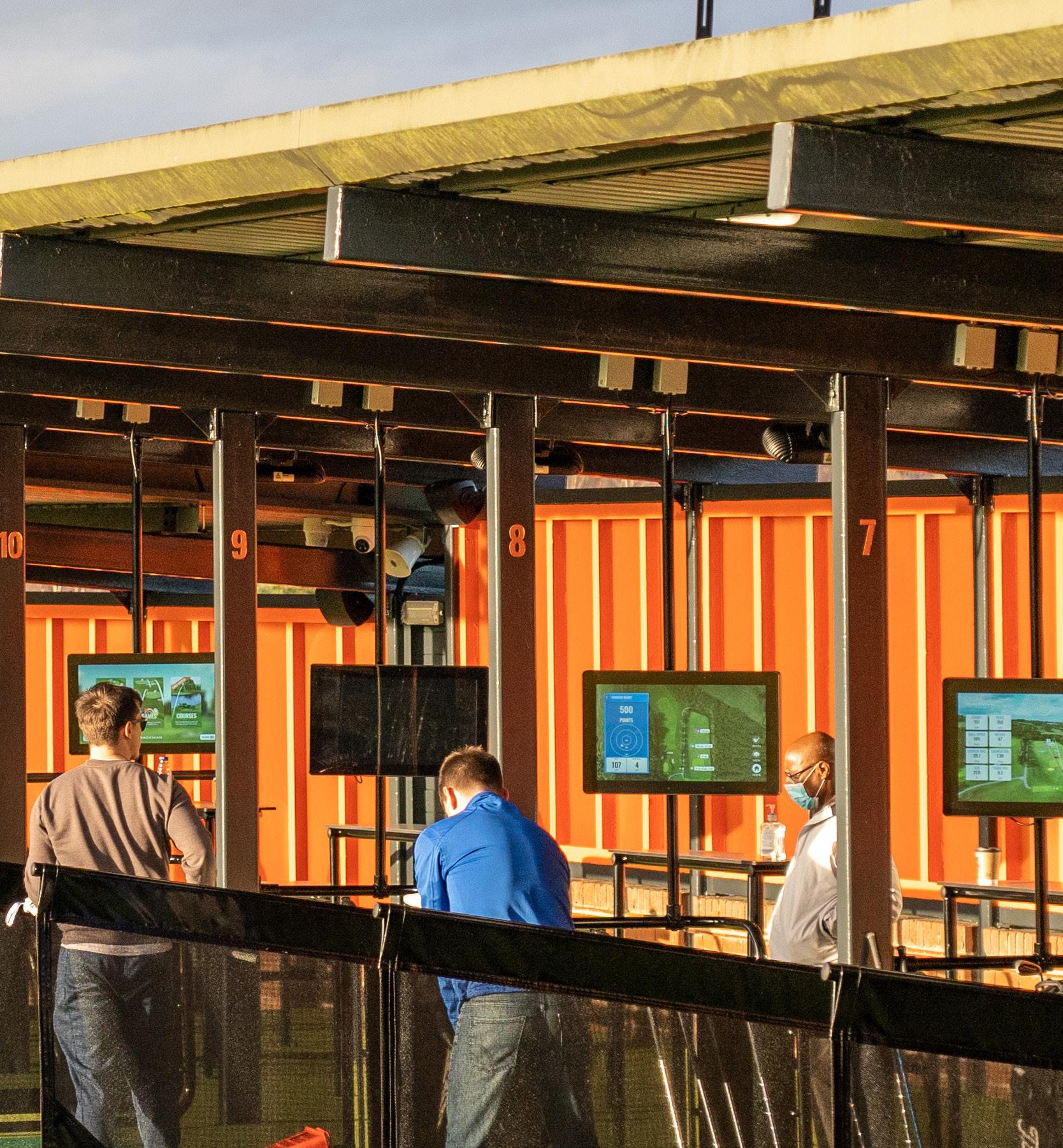
Burhill Group Limited Burhill Group Limited was founded in 1926 with the prestigious Burhill Golf Club, in Surrey. The company entered the pay and play market with Hoebridge Golf Centre in 1982 and BGL Golf now have 10 properties throughout the UK. They are one of the UK’s largest owners and operators of golf facilities, seven of which are pay and play and three are more traditional clubs. The BGL Golf vision is to “offer great destinations for every golf and leisure occasion” with the aim of providing accessible and affordable golf to players of all abilities. BGL also operates Adventure Leisure Limited and its 10 sites. Adventure Leisure is the leading operator of leisure venues across the country, both indoor and outdoor. With an aggressive expansion plan it is rapidly growing to become the leading operator of Adventure Golf across the UK. At the heart of the business is fun for all the family and every age group.
consistency throughout the business, which leads to improved performance, decision-making, and commitment. When people know the company that they are working for is committed to them, they will hopefully perform at a consistently higher level. It’s as simple as that. It’s not rocket science.
This is a very interesting era in golf club management. It’s a time of rapid change, particularly with the pandemic. The aspirations and future for golf look different as a result of what we’ve seen over the past year. How do you see the future of club management?
I’m cautiously optimistic about its future. I’d caution people to think, just because the pandemic has increased participation to such a high level last year, it’s the answer to our problems. I think it’s far from it.
We’ve been extremely lucky, and you’ve got to think of it that way. This didn’t come to us by strategic planning. This came out of a pandemic that closed nearly every other activity down and golf was one of the few things you could do. Now, if you’re the only game in town, you’re going to be pretty busy. That’s been fantastic and we’ve got to take that opportunity.
But the bigger challenge, with all of those people that are either back engaged with our game, or have taken the opportunity to get engaged with our game, is what strategies have we got in place to keep them and make them want to keep coming back? That comes back down to golf focusing on what it should be doing in the first place: making sure the establishment is welcoming and has facilities that are in tune with what the customer wants.
We’ve had huge success on our driving ranges. We’ve been investing heavily in TrackMan. We spent nearly £500,000 developing Hoebridge and we’ve done the same at Redbourn. We’ve also got Toptracer Range technology installed at Wycombe Heights and our Sidcup Family Golf Centre. We’re on site even now, though golf has been closed and cash is tight, installing TrackMan Range at Birchwood Park
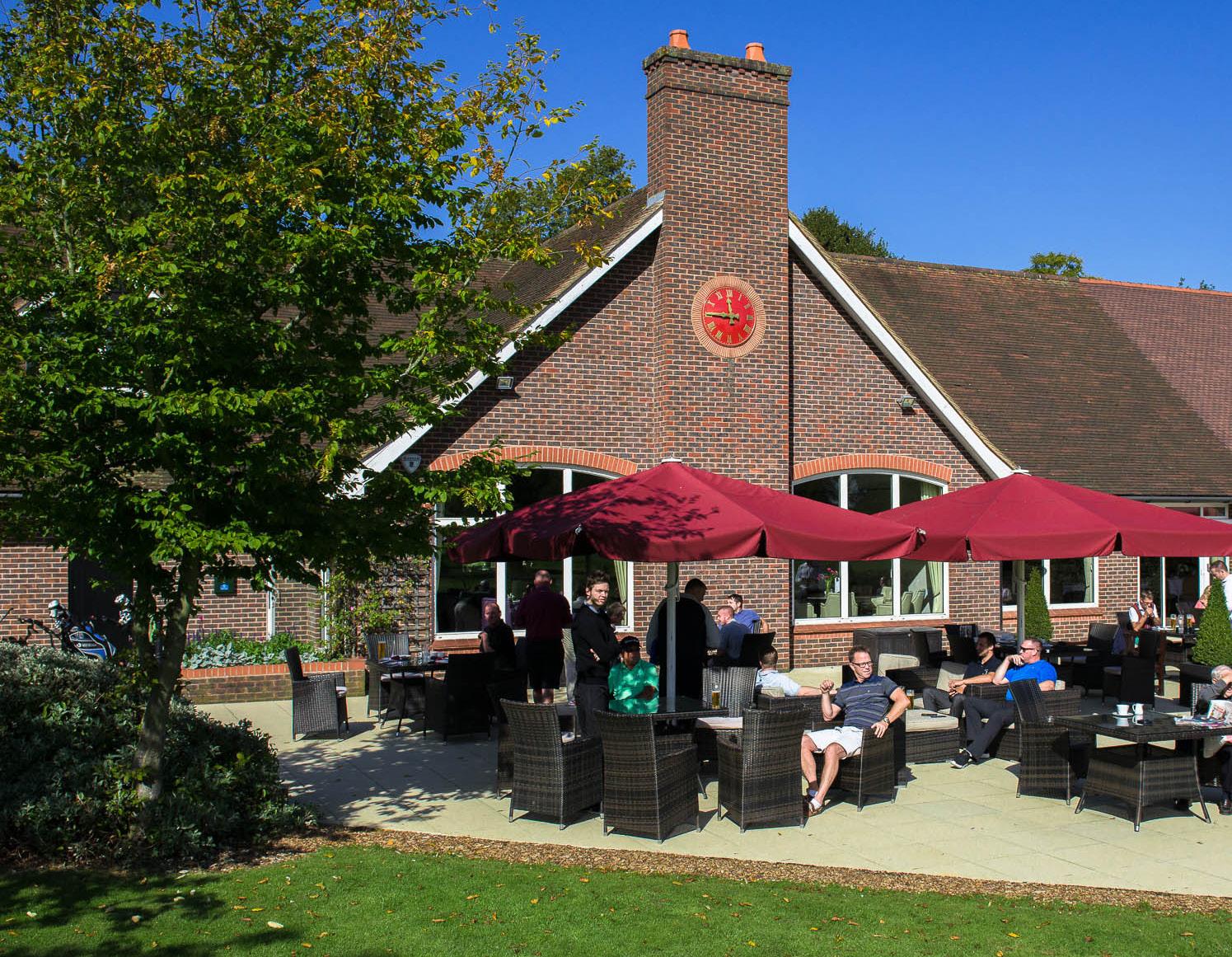
and we’ll have that ready for when we re-open. It’s about making sure you’ve got the right facilities, and management that are geared to provide a high level of service.
One of the big things we focused on last year was making sure we had the data of people who were playing golf – so that we could make sure we made contact with them, be in regular contact with them, and try and give them reasons to come back. I’ll bet you a reasonable amount that probably half the golf clubs in the country took the business, got them on the tee, and just let them go. I’ll bet half wouldn’t have got any of their contact details or ensured that this information was used to keep in contact and give them a reason to return.
I wouldn’t be as bold to say we managed it 100%, but we certainly managed a very high proportion of those people - because everybody had to book online. We made sure we mined that data and used it to keep in touch. With so many new golfers to the game last year it made us think: how do we go out and market to that new golfer, or to the golfer that’s come back to us, and make sure we’ve got the appropriate incentives for the future?
We’ve got campaigns ready to go if we need them to encourage people back. If we re-open as the only game in town again, that’s going to be great, because that will help the season kick-off and you don’t need me to tell you that golf is very habit forming. I’ve always said if April coincides with an exciting Masters tournament and reasonable weather, people will get their golf clubs out of the garage and get engaged. As long as clubs do a great job in making sure that people feel welcomed and have a good experience early on in the season, most of them will come back for the rest of the summer.
We’re going to have a new situation this year as we come out of lockdown when hopefully demand to get out on the golf course will again be very high. We know what to expect and will be in a very good position to take advantage of the demand and hopefully ensure that a
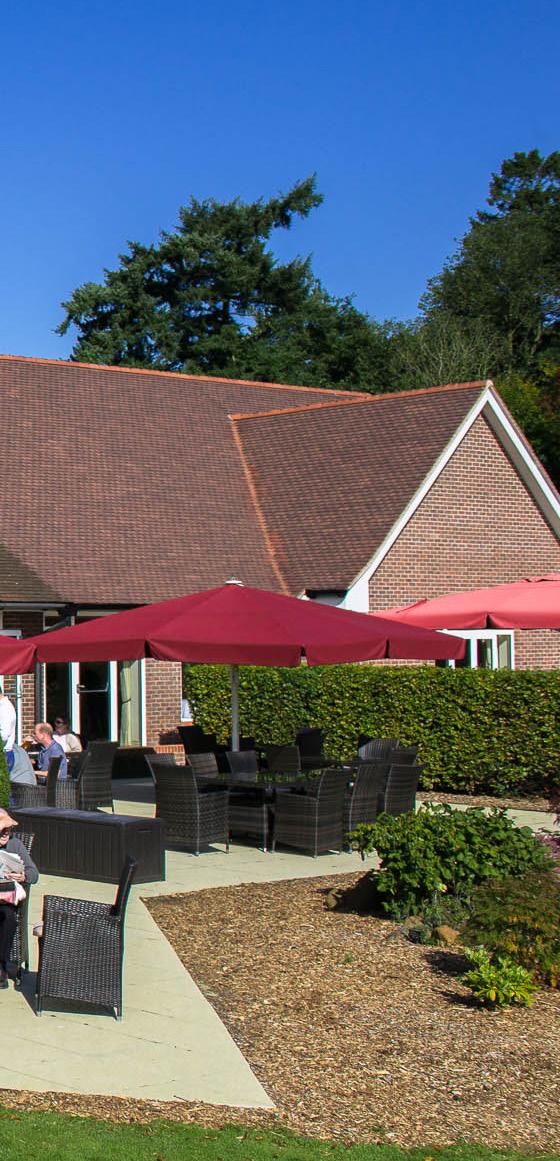
high proportion of these golfers stick with us during 2021 and beyond. I am cautiously optimistic for our great game, but if other things opened up immediately, and I’ve seen it before in this industry, where the start of the season gets hit with some very bad weather, that can have a dramatic effect on rounds played.
What key skills are going to be required to make the most of that? What will you be looking for in your staff? Top of the agenda is a very keen eye on customer service. Are people enjoying their time at your facility? When members or visitors come in, have the team got the skills and knowledge to recognise that a customer is not as happy as they should be? If you have that, have you got your people trained well enough to change that scenario and make a difference to that persons experience on the day? That’s where the training comes in and why the systems and support are so necessary.
The conditions of your facilities have got to be good. I know it’s pretty boring, but I continually focus on kerb appeal. Does our entrance look good? Is the car park free of litter? Are our reception areas, changing rooms and toilets clean and well presented? These days, even in some of the oldest pubs and restaurants the facilities are still pretty good. If they can do it, dealing with their volumes, golf courses have got to be similar, if not better. It is about providing high standards of facilities and, where you’ve got the opportunity, taking a leadership position in making sure your technology – whether it’s paying out on the patio and not having to go all the way back into the bar to settle a bill, or the driving range technology – makes for enhancing that experience.
We need general managers and management teams that put customer experience at the top of the agenda, making sure their facilities match the customers’ requirements, and at a price point you’ve decided you want to pitch at. Sometimes, I think golf clubs can get confused with what they want to deliver compared with what they want to charge. They don’t join up the dots quite right. You see, many people have aspirations for a fine course, but perhaps haven’t got the resources to do it. You can’t create a fine course unless you have a fairly significant budget – both for income and expenditure. It’s got to be tuned properly. I see so many people get that wrong. Managers of the future will be people who are very in tune with their customer base, understanding what is important to them and their budget. That’s hugely important and that’s the difference from the old-style club manager. The old-style manager was about making sure the members knew their tee times, understood their handicaps, and it was very golf orientated as opposed to creating an experience for people and a place where members and visitors can relax and enjoy themselves with friends and family.
How has club management changed over the course of your career and what’s going to be important as we move forward? If you look at the clubs that are doing well, whether they are very traditional or very commercial, good basic management principles don’t change. The focus on customer experience has really climbed and golf club managers today have got a real sense that they’re running a hospitality business. It’s about making sure a member or visitor feels they’re almost going to their home-from-home.
Take Tristan Hall at Sunningdale. He used to be one of my managers and he’s running a very old and highly respected golf club now, but he’s moving it with the times. The food and beverage offer has changed quite considerably. It was very homely before, now it is pretty savvy, and you’d be quite happy to go there for a dining experience. There’s the clubhouse refurbishment – it’s more a home-from-home, as opposed to being very ‘golf clubby.’ The business is continually investing and these days, it’s about general managers providing a hospitality experience, rather than just a golf experience. It’s much more than just golf.
Craig Brown, General Manager at The Kidderminster Golf Club, sits down with Golfplan to discuss how the Club Policy has benefitted the club and its members
The Kidderminster Golf Club

How long have you had the Club Policy? We have now completed two successful years, approaching renewals for our third.
How did you hear about the Club Policy? It was yourself who presented a GCMA presentation for one of our regular spring meets, I believe it was. It was kind of good timing for me because I was just starting to look at a policy for the club to make it compulsory for all our members, so it tied in well.
How did you find the set-up of the Club Policy and the administration of it? It was very easy and straightforward. The communication was good and was done relatively stress-free.
What do you feel the value is of the Club Policy to you as a manager? It’s quite valuable here at Kidderminster because we have many holes surrounded by houses. We also have a road that runs through one or two of the holes, as well as running alongside several others. It was protection for the golf club and also members so that they knew when they went out to play they had full comprehensive cover.
The change for us is that members are now phoning proactively to tell us of any incidents. There’s never really that many, but they’re telling us before rather than us finding out weeks later from a neighbour that’s complaining. It’s kind of shifted the way incidents are reported. They’re very clear on what they’re covered for now, rather than kind of worrying that they might get in trouble if they were to tell us and that the club perhaps isn’t covered for the things that they may be asked to pay for. It’s really changed their behaviours.
Do you feel the Club Policy has added value for your golf club and your members? As we’ve now completed two years, we did make it compulsory at renewals to have some kind of cover. Over the last two years, various members have moved over from existing policies, even some with yourselves privately due to comprehensive policy cover and the price. They’ve definitely seen an element of value for money, for both those that had cover before and those that didn’t.
What were the main reasons for wanting to offer the Club Policy to your members? It was really to give the golf club that peace of mind as well as the members. That’s really helped both parties.
How have your members then responded to the policy? It’s been positive and numbers have really increased over the two years, from those that have switched policies and those that joined because we made it compulsory in a fairly large number. That number has grown because they’ve shifted over from existing policies from other providers.
How have you found the help and support from Golfplan? It’s been good. And one of the big things is that you’re always accessible. You’re not sold the policy and then go through to a call centre. That feedback has come back direct to me from a few of the members that have had a claim. From giving them your contact details, they’ve always managed to speak to you or the people in your office and it’s been positive.
Would you recommend other managers explore a Club Policy for their members? If so, why would you do so? Absolutely, yes. The biggest thing is the members and the protection of them, whether it’s a road, houses or whatever it may be, there’s a comprehensive policy for that.
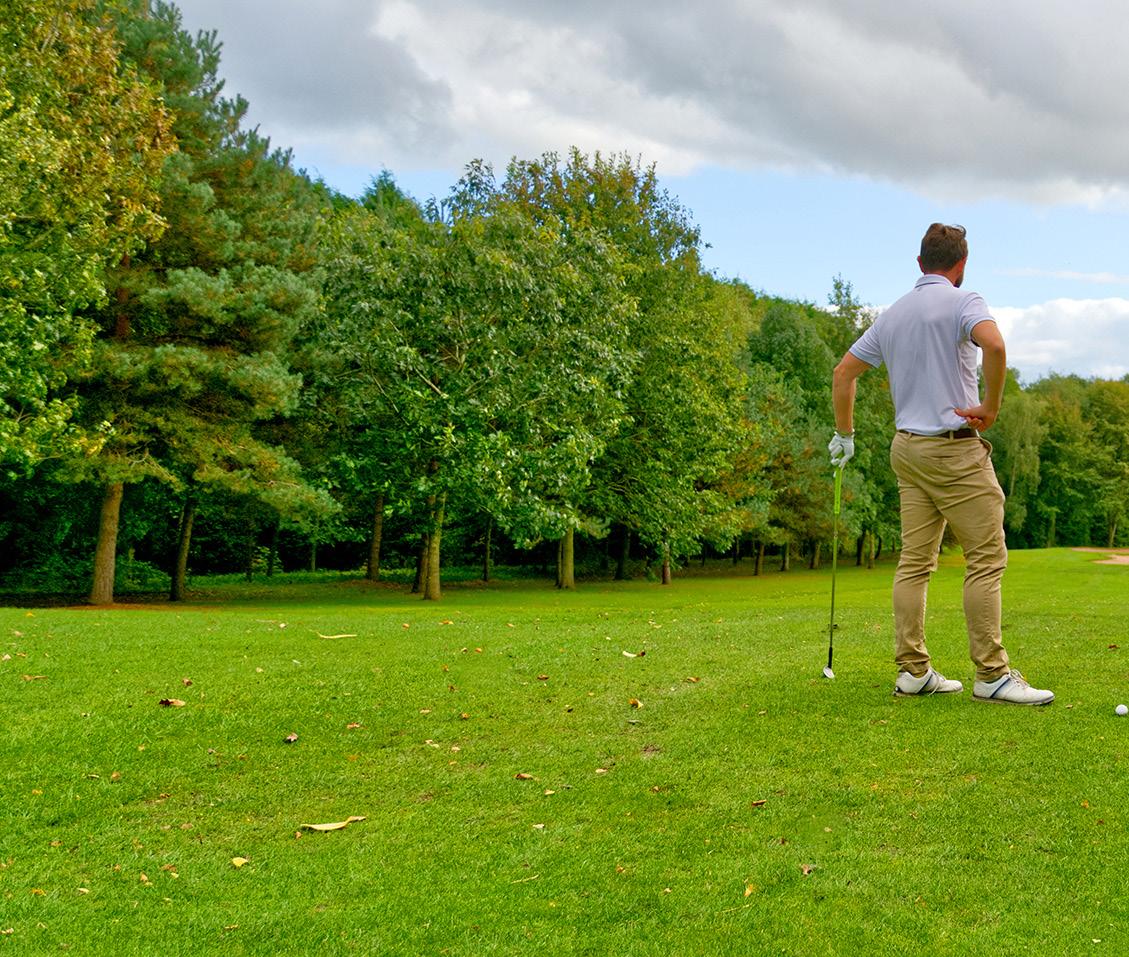
From a manager’s side, it is peace of mind. The board of directors are worry-free because the protection is there for the club and then peace of mind for the member. They’re protected, not just at the golf course, it’s home and away.
Do you feel that golf insurance is important to members? Should they be thinking about taking it out if they haven’t already? I think it’s been a bit of an eyeopener for all our members. It was really a strong case that I put across to the board to get their authorisation to make it compulsory because they really need to have it.
There are probably plenty of members that think they don’t need it, but they really do. Their gear is changing all the time and just because they think that their clubs are five years old and they’re not worth a lot, once they are stolen they have to replace them by going to buy new. That’s not necessarily a few hundred quid.
Golfplan is a trading name of A-Plan Holdings who are authorised and regulated by the Financial Conduct Authority.

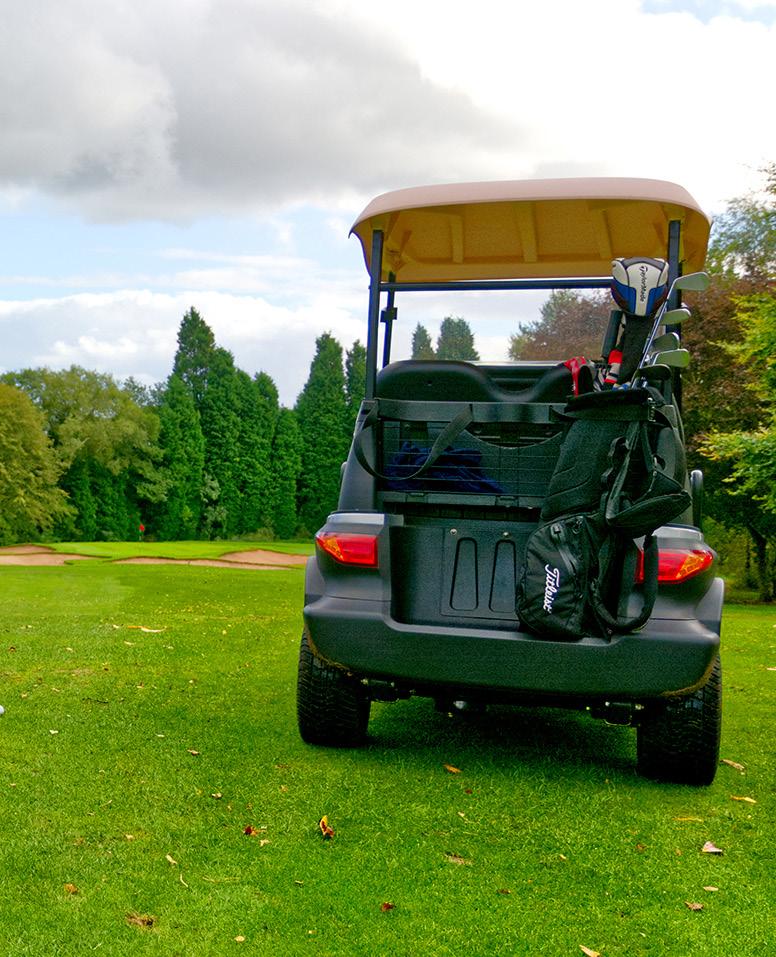

What do other clubs think of Golfplan’s insurance?
“A reliable and efficient service.” Jon Northover, Manager at Robin Hood GC, Feb 2021
“Alex and the team have created a fantastic product that adds huge value to our membership.” Chris Cotter, Membership and Golf Club Administrator at Edgbaston GC, Feb 2021
“The introduction of Golfplan provides our members peace of mind to enjoy their golf.” Stuart Turner, Secretary at South Herts GC, Jan 2021
“I would recommend booking a meeting with Alex at your golf club to see how the Club Policy can work for you.” Tony Moon, Secretary/ Manager at Copt Heath GC, Nov 2019
Call Alex and his team today to find out more about the Golfplan Club Policy: 01527 868160 golfplan.co.uk
business partner

Are you looking for a solution to add value to your membership and provide protection for your members and golf club in 2021? Offer the Golfplan Club Membership Policy for your members.
“We now have over 100 members signed up and the number continues to grow each month.
“Members have commented on the swift claims process and how the insurance is such great value for money.
Chris Cotter | Membership and Golf Club Administrator Edgbaston Golf Club | February 2021
• Take this policy out at your golf club today and cover your members as beneficiaries • Stand out from the industry and add these members benefits into your membership package
PLEASE NOTE: Terms and conditions apply, for full details of policy cover/benefit limitations and exclusions, please refer to our policy wording and summary of cover, a copy of which is available upon request.
Call Alex and his team today to find out how: 01527 868160 | golfplan.co.uk
A matter of opinion: The independent GOLFER

England Golf’s plan to offer official handicaps to non-members has proven controversial with club managers but what do those in favour think? We asked a pair of managers to explain why they’re backing the initiative

It’s one of the biggest issues in golf at the moment – and that’s saying something in a pandemic.
England Golf’s plan to progress an independent golfer scheme has caused plenty of comment and, in some cases, led passions to run high.
Critics of the proposal claim it will entice people out of club membership, while also threatening the integrity of Open competitions – which provide facilities with valuable revenue.
But opinion is split. There are also a number of managers who welcome the initiative and think it has the potential to grow the game.
Two of them, Jennie-May Smith, manager at Brailsford Golf Centre, in Derbyshire, and Andrew Watson, general manager at Holme Hall, in
Lincolnshire, come together here to explain their point of view…
You’re in favour of an independent golfer scheme. What do you like about it? Jennie-May Smith: For our business, nomadic golfers probably make up two thirds of our revenue every year. We’ve been looking, for the last 12 months, for ways to connect with them. They’re a huge part of our business and all we can do is data capture and try to get them back and encourage them to participate more.
From my point of view, the independent golfer scheme is just perfect. It could potentially provide us with this enormous database that, obviously, England Golf will hold. It should allow us to contact these people, get them engaged, see what their playing patterns are, their habits, and to learn more about what they want. I think driving engagement in our sport can only ever be a good thing. I’m, personally, struggling to see any negatives. Andrew Watson: We’re one of seven golf clubs in a 10-mile radius around Scunthorpe, with a population density of 140,000 people.
It’s not sustainable and so we’ve spent the last four or five years encouraging societies, green fee payers, and trying to sell the very best of everything Holme Hall to them. We also think the membership model is antiquated.
I’m not saying we can’t have members’ clubs, and elements of members’ clubs, but golf clubs aren’t going be able to survive indefinitely on members.
One third of our membership is 70 plus, so they’re not going to be there in 15 years’ time. If nomads are out there and want to come as repeat business and use the club facilities, we only see positives from that.
There seems to be two main concerns from those who aren’t supportive: the potential to take members away and the question of handicap integrity in Open competitions. How do you see those concerns? JS: I think a lot of these reactions are being driven by where we are at the minute. We’ve all spent the last 12 months reacting to ever changing circumstances, new restrictions that are coming in, the World Handicap System. We’ve had a lot to deal with.
When I first heard about this initiative my initial reaction was ‘Here we go, something else we’ve got to react to [with a presumptive eye roll]’.
I do think that is a big driver. As far as worrying that we’re going to lose members because they’re going to find this nomadic way of playing more appealing, I’m inclined to disagree.
Joining a members’ club is very different, and you don’t just join for the handicap. You join for the
social, you join for the community, you join for the friends you make and the competitions.
I think anybody who’s worried about losing members to this scheme is undervaluing what they’re offering as a membership. The nomadic golfer is, typically, a younger demographic and they want something different.
So it’s an opportunity for us to diversify. Let’s have a look at what we can offer these people. It’s not going to be the traditional membership model, I think we know that. But for golf as an industry, I feel we’re moving forward in leaps and bounds now and this is just the next step. AW: We’ve done a lot of work with our societies and we understand them. A lot of them are past golf club members and the membership model didn’t work for them. They’ve effectively become nomadic. So I think a lot of this migration that managers are worried about has already happened.
What you’ve got out there is 1.8 million golfers, apparently, who are free to play golf whenever they want. Multiply that by £35 and you’ve got the best part of £60 million out there in terms of green fee revenue.
If you’ve engaged with them on a regular basis, you’ll get repeat business for your club. Some, if they are local, will begin to settle.
But all golf clubs recognise they need to have better facilities. We’ve got a driving range now and we’re building a swing room.
We’re improving our course, going back to a heathland, and we’re improving the short game facilities. There are opportunities there to engage with these people.
We talk about handicaps. I’m playing on the UK Senior Tour these days and I play for the UK Senior Golf Association. I see the appeal of it.
Rather than shelling out £800 a year, I could take range membership or pay an associate membership, use the golf club for practice and still play lots of golf around the country, which would keep me very happy. I guess we’re talking about lifestyle choices.
The final thing I’d say about to managers is ‘don’t fear it’. Jeremy Tomlinson has said very clearly they will manage handicaps.
Now if all 1.8 million become nomads, I’d love to see that, but, equally, they are going to be taking a fee from these people. The pot will be sat there with England Golf and there’s been a very clear statement that they’ll share that with clubs.
There’s an opportunity for the right clubs to tap into that to develop their business model – to further gain access to this nomadic group. It’s an opportunity we just can’t afford to turn away.
Could there be a split between proprietary clubs, who appear more in favour of the scheme, and private members? Could the latter miss the boat in terms of the revenue out there? JS: That’s a really tough question because we’re all running the same race. We all want to drive participation and engagement in golf. The business background of that is almost irrelevant.
Traditional members’ clubs will have their place. And if the independent golfer scheme drives people to get more involved, you might not be welcoming pay and play so much but it might be time to move forward.
It’s going to change the way these clubs are run and it is going to involve some diversification. But if it doesn’t, and those clubs don’t diversify, they’ve still got a really important place in the golf industry. The traditions that come with a private members’ club are historic and there’s always going to be an appreciation of that and people who will prefer that style of club. AW: I don’t think there’ll be any more damage to private members’ clubs. We’ve got 500 members but 130 of them are associated with the senior section. When we first mentioned the idea they [nomads] could play in open competitions there was general indifference. They’re fine with that.
As for monthly medals, which is what we suggested to our members, the issue wasn’t so much ‘can they play?’ There didn’t seem to be an issue with that because people realise they’ve got mates who are nomadic golfers. The big question we got, which is very traditional question, was ‘will they be able to play before 10.30?’ 7am to 10.30am at our club is member time. The answer was ‘only if you bring them as guests. Other than that, they’ll play at other times’.
I think our members understand we’ve very clearly delineated about when there’s private members’ time, and when we have green payers and societies. And, even on a medal day, we welcome these people.
What we’ve also said to them is that, in the first instance, any prize money they win will be credited to the pro shop as with any other member.
The winner of one of our medals might get £30, so they’re not taking that out of the golf club and straight down the pub. I don’t think we’ll have a huge issue. There will be one or two, I’m sure, that will have a view.
But, from our perspective, we’ve been clear for five or six years now to our members that they don’t pay enough money for exclusivity.
There are parts of the golf club for private members and other

times for visitors and guests. That’s worked quite well for us, so we don’t have the same fear.
Is it an opportunity to take control of a tee sheet, to affiliate people with the club and provide some future membership opportunities? JS: One of the most important things about this is that, we’re told, every club will have the opportunity to do it their own way. I’m really excited to watch how other clubs react to this. We are considering the logistics of how we could deliver this effectively and professionally. I just think it’s such an opportunity. One thing that really excites me is how it actually happens.
I’m assuming it’s going to be an app-based initiative. I’m hoping there’s going to be an area in that app that gives us the opportunity to see who’s playing our course, to see what they’re doing, what their behaviours are and I would like to utilise that.
It’s something we’ve tried to work on ourselves in the past – to capture these people and communicate with them. I’m quite happy to let it unfold and see what other people do with it and see where the opportunities lie.
None of us know quite what direction it’s going to take or quite what’s going to happen when it’s rolled out. I’m open minded. AW: We’ve always tended to regard societies and visitors as day members and we have tried very hard to recruit them to membership.
We probably pick off, on average, one person per society each year that joins the golf club. They tend to be fairly transient, by and large. We’ll get a couple of years out of them whereas we really want to have people for five years or more.
As Jennie said, we’re hoping to get access to this group of nomadic golfers so if they have the app, perhaps you can advertise on it or give availability or have a list of clubs who do have availability.
We have well over 100 members every week that play in a medal or board competition but the tee

sheet’s never full. We always have slots that are going spare. If you’ve got a three-ball going out and there’s only two players, there’s £35 that’s available for use.
We won’t allow people to enter board competitions. That’s what we regard as the tantaliser. We’ve engaged with PlayMoreGolf and, very successfully, got a lot of people through.
Once they realised they could play medals, but they couldn’t play the board comps, they very quickly began to migrate into full membership. They’ve given our membership a boost over the last year or so we’ve engaged with them.
We see the nomadic golfer a little bit like that. It’s an opportunity to sell what we do, make sure they come in and have a great bar and catering experience. The first time they come we make sure they get a basket of balls for the driving range, we make sure the pro is around to have a look at their putting stroke and so on.
Hopefully, if they do start thinking about joining a golf club they’ll think Holme Hall is the place to be.
What advice would you give your fellow golf club managers who are concerned about the scheme? JS: I’d like to encourage people to stay open minded. Consider the bigger picture. Look at the

potential benefits to our industry, not just your specific club.
It’s very forward thinking. It’s kind of a revolution for golf, isn’t it? I’d like to encourage people to try and put their trust in England Golf.
I know, historically, golf managers have experienced ‘interesting’ relationships with England Golf, but I genuinely believe they have the best interests of our clubs, because why would they not?
They’re not going to do anything that’s going to damage the industry. There are only good things coming through this. AW: What we should be trying to do, and what the GCMA particularly need to be doing, is helping those managers who perhaps feel their committee are of a certain age, or mindset, and there will be some difficulty. It’s just a question of engaging with them and explaining what the benefits could be and why this shouldn’t be feared.
Just because you’ve got someone coming to your club as a nomadic golfer, playing in an open or a medal, doesn’t mean the world’s ended and 120 years of tradition is going out of the window.
We’ve all identified that pretty much every golf club needs green fee income to survive.
This is just another string to that bow.
Meet The Panel
Jennie-May Smith, manager at Brailsford Golf Centre, in Derbyshire
Andrew Watson, general manager at Holme Hall, in Lincolnshire
Aneil Chauhan considers himself lucky. He can fill his days – delivering a mental health project he’s hoping to launch with England Golf – but time goes quickly and keeping productive is a challenge.
As operations manager at Stonebridge Golf Centre, Aneil was tasked with telling staff last March and November they were going on furlough.
When lockdown shut the doors of the Coventry club for the third time at the start of January, he found himself staying at home with them.
You might find this surprising, but the clock can race away from you when you’re on furlough. It’s easy, if you’re not careful, to waste weeks.
“In terms of actually finding a reason to get up in the morning, I’ve been finding it quite difficult,” Aneil admits.
“Keeping on top of time and keeping yourself productive is one thing that all the staff have said they have struggled with. I think that goes for everyone.”
Club staff have become the forgotten faces of golf during the coronavirus pandemic. We know all about the time members have lost on course, and we know about the effect padlocked gates are having on bottom lines.
But, across England, Wales and Ireland, thousands of staff have lived a strange existence since our way of life so dramatically changed last spring.
From week to week, they’ve wondered what the future holds as they’ve come on and off furlough when cases have risen and dipped. Some, of course, haven’t come back to work at all. For Aneil, the experience of seeing how that all worked, and the knowledge that everyone returned to Stonebridge before, helped soften the blow of sharing a similar fate this time.
“I don’t think I had the shock that other people did in the first two – where they were unsure about the route back in and what would be needed.
“Now we know the process of what’s going to happen when things do start to open up, and that there is an end to this, it made me feel OK.
“But, at the same time, you feel quite bad for the members who are sitting at home, can’t do anything, and have paid their subs for January.”
He adds: “We’ve done it before, the staff know that this is temporary and we’re going to do everything we can to keep them on, and [so] it’s different.
“The first lockdown was hard. No one knew anything at all about how long it was going to be – originally it was going to be three weeks – and then everything changed from there.”
As Aneil speaks, lockdown seems open ended. The mere whisper of a loosening was provoking cries whichever side of the debate people are on.
What seems likely, though, is that clubhouses won’t be opening any time soon and, consequently, furlough won’t be over for many staff either.
“From my point of view, and my position, I think my return is open ended,” Aneil said when asked if it was hard to stay motivated.
“Because we’ve done it before, the team that we’ve got know the process and what will be needed when we do.
“After the first lockdown, when we reopened, it was basically opening a golf club from scratch.
“We had to redo the tee-sheets. We had to send out a whole different booking process. This time, we kind of know what we’re going to relaunch.
Golf club staff have lived a strange existence recently. One manager reveals how he and his staff have been coping with life on furlough


“You can kind of guess it’s going to be two-balls when we reopen under the same rules. It’s hard. It’s hard to stay motivated and I can’t really answer that question.
“I guess it’s just playing golf again. It will get back to normal and, working over the last couple of lockdowns, you see that there’s still interest.
“Even when we were closed you still got membership enquiries, you still got wedding inquiries and you still got big conference enquiries.
“So it’s motivating to know that the world was still ticking over and people were still interested in doing things and looking forward to the future. That was a good motivator.
“I guess I’ve lost that this time on furlough so I’m looking for that motivation. That was what kind of pulled us all through the last one, especially me and the GM. When you’re in lockdown you don’t know what’s going to happen and when you get a conference enquiry that want to block book with you it’s a big boost and you get going again. It’s hard at the moment.”
But the spring beckons, though it seems so far away at present, and the promise of better times lie ahead.
Aneil thinks the golf boom that surprised everyone last May will continue as parts of our lives get back to normal ahead of others. Even the most pessimistic person would agree it’s likely we’ll be back on a golf course before we’re in a football ground.
Stonebridge, like so many others, rode that popularity train in the summer and Aneil sees the chance to push on once more. There’s a waiting list at the 27-hole venue and a “massive membership base is now even bigger”.
And while furlough has been far from ideal, he will take the positives from such an unprecedented time in his life.
“When people were on furlough, and I was working, I was constantly telling them ‘take advantage of the time to just do whatever you want to do and relax and switch off. You’re not going to get that again - probably in your lifetime’.
“So I think it’s just a rest and a reset and to be able to go back with a fresh mind and look at it from the golfer’s point of view.
“At the minute, I’m sitting here as a golfer wanting to play golf. I can’t and I’m waiting for my golf club to send me an email of when and how we’ll open.
“It’s quite good to see it from the other side and see how much communication matters to members.
“But it’s the rest, and the reset more than anything now, because you really want to get back on it straightaway.”


THE NEW ORDER
As we come out of the latest lockdown, there’s a great opportunity for the golf industry to embrace technology and drive business forward. OrderNext presents that opportunity for F&B, as Sales Manager, Quentin Townsend explains…
What is OrderNext? OrderNext is a product offered by VenueNext Europe. OrderNext was created to provide a simple, contactless way for sports fans to order F&B from their phones. Who is VenueNext Europe? VenueNext Europe is an operating division of Shared Access. Shared Access is an independent wireless telecommunications infrastructure company. It has strategic partnerships with major sporting, property and government organisations and has developed critical communications infrastructure in a number of high profile settings, including the new Tottenham Hotspur stadium. How does the system work? Customers simply scan a QR code with their phones and they’re taken straight to your branded menu where they can place their orders. Most customers are surprised to find that their mobile phone camera acts as the QR reader, with no app to download - so they land on your F&B menu page in just a couple of seconds.
What are the benefits of using OrderNext? It’s all about the customer experience, whether that’s for golf members or other customers using your event spaces. You strategically place the QR codes all around the venue - on the clubhouse tables, on the tees, in the halfway house, in the driving range bays, in the bar, in fact anywhere you want to offer F&B to members and visitors. You could even email the code to your members so that they can scan it in their car before leaving home and pick up their bacon butty and hot coffee on arrival. And of course there are all the obvious Covid-safe benefits, which include reduced interaction with staff, not having to touch any external hardware or to handle cash.
How could our members use their membership discounts or their pre-loaded cards? They simply add their membership number in a promo box on the checkout screen. The membership card details would have been pre-loaded onto the system, so the discount will be automatically applied. It doesn’t matter whether you have a 10% offer across the board or six layers of different discounts, the system will manage it. If your members have preloaded cards, we can work
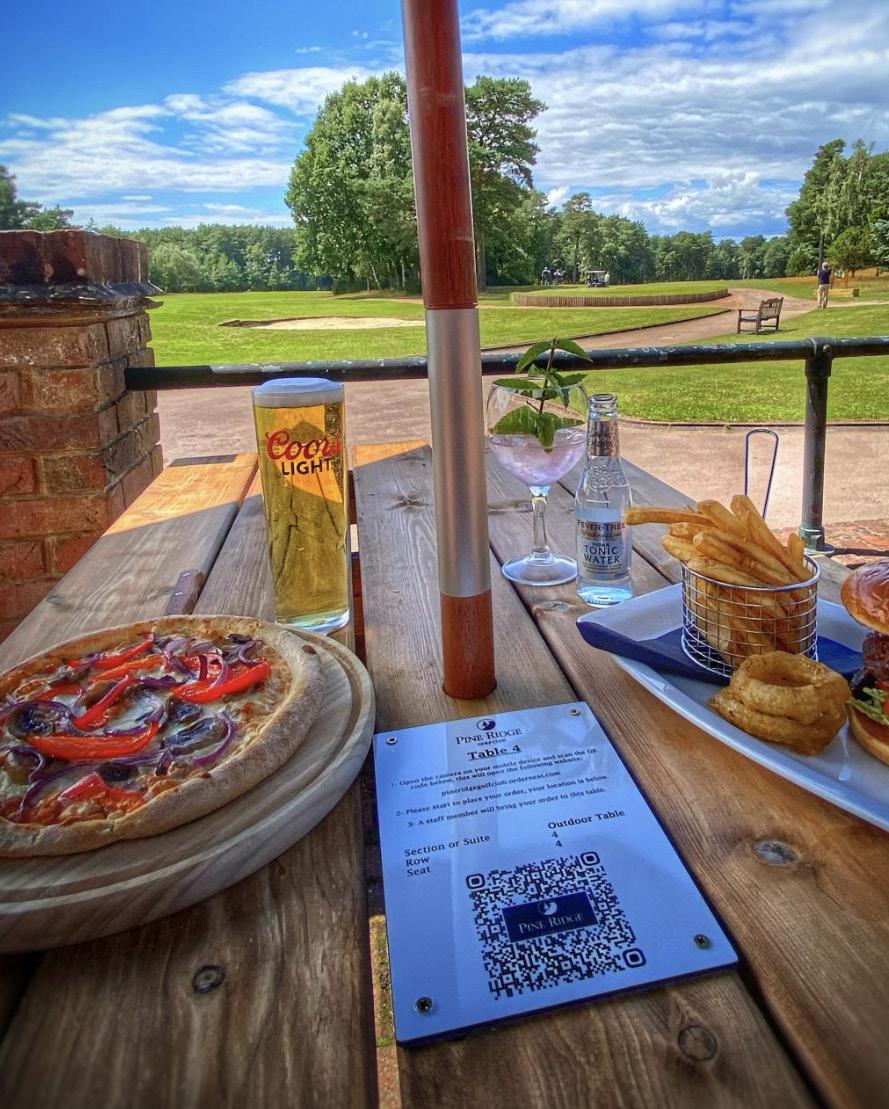
alongside your current EPOS system to give them the same experience with no additional costs.
Sounds great – but will our members actually use this technology? All the clubs that have come on board with us have been genuinely surprised by three things – how easy the system is for their members to use, how easy it is for them to operate the system and, crucially, how brilliant the uptake has been across all age demographics. Recent figures from our partner golf clubs confirm that 78% of all F&B takings are being processed through OrderNext. So it’s clear that members are really happy to embrace this technology.
Will OrderNext enable us to increase our F&B sales? OrderNext allows you to increase F&B engagement with your members and other customers. Table toppers can be used to promote your QR code wherever you want to offer F&B – and these are both inexpensive to produce and simple to use. The convenience of the QR code means your members and visitors no longer have to queue at the bar to order anything – and the system ensures that orders are delivered to the customer’s exact location. Getting a second drink or ordering some food becomes much more appealing if you haven’t got to get off your seat and walk somewhere to do it!
How quickly can you implement OrderNext at our club? We can get you set up and running within a month. If you give us the go ahead in March, we can build a bespoke programme that will be ready for you when your clubhouse reopens in April.
What training do you offer our staff? We’ll train your staff (remotely) within an hour. It’s that simple to use – and almost impossible to make an error. You will have full 24/7 access to our back-end system where you can easily amend items on the menu.
What is the cost? It’s £3,000 pa – and in order to help during the current situation we’re offering clubs who sign up now, the ability to pay monthly, so that’s £250 per month. As has been the case with our current partners, we aim to have the full ROI back for you within the first financial quarter of trading using the OrderNext product.
Anything to add? OrderNext reduces the touch points between your staff, members of your club and visitors, so by using it you will be helping to keep everyone safe. In this postCovid world, we all have new expectation levels in terms of safety and enjoyment; meeting and exceeding your members’ and guests’ expectations is critical and will directly influence the customer experience. Many golf clubs are now coming to terms with the fact that they need to change the approach to their F&B offering. OrderNext is here to help you make the necessary transition, quickly, simply and efficiently. Scan the QR code and try it out for yourself!
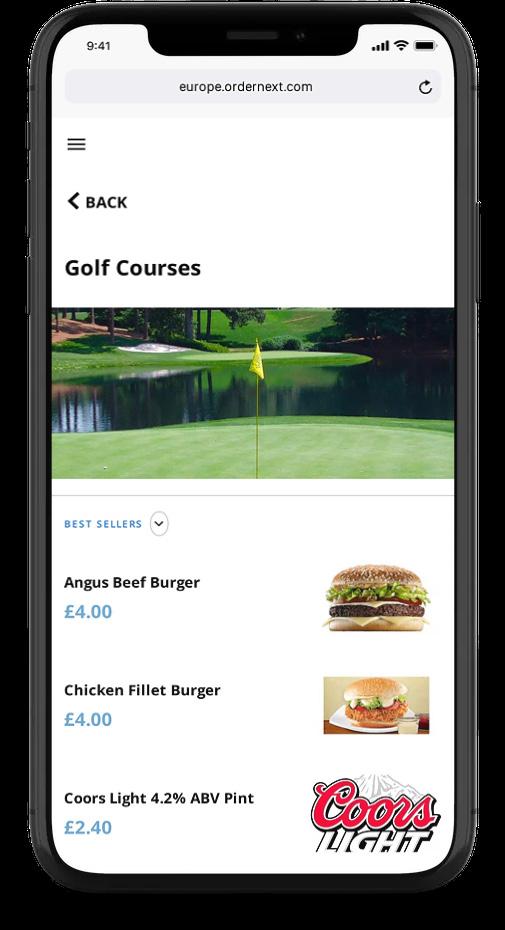

Partner with OrderNext now and only start paying for our service when your club is operational.
07718 623854 quentin@venuenexteurope.com
Scan the QR code and try it out for yourself!


Prepare your club for a post-Covid world. Streamline your customers’ order experience and enhance your venue with contactless ordering.
Partner with OrderNext now and only start paying for our service when your club is operational.
07718 623854 quentin@venuenexteurope.com






